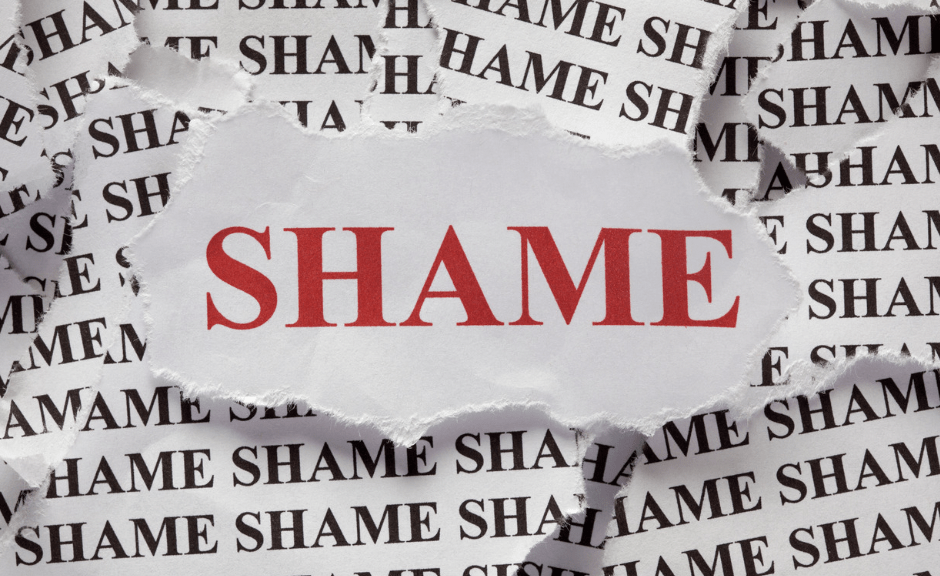
When Shame–Er, Purity Culture—Becomes a God Term
So this week I had the strange experience of re-reading the book Pure by Linda Kay Klein when an article came out suggesting that Evangelical missionary, martyr, and purity culture icon Jim Elliot seems to have longed for death at the end of his life because of struggle against something unspecified that he deemed a (sexual) sin. Considering Pure is an ethnographic study of the damage and trauma caused by the Evangelical purity culture movement that was in part pioneered by Jim and his wife Elisabeth Elliot, it felt like a great opportunity to talk about a theme Klein outlines in Pure: how literally damaging it is that purity culture is all about shame, especially sexual shame. And—spoiler alert—that’s not healthy.
So—another spoiler alert—we should be assertive about the bad fruit that brings, and strive for healthier systems.
The Broader Impact of These Ideas Outside of Evangelical Subcultures
If you feel outside of the purity culture subculture and are wondering whether to take the time to read this analysis, well, Christian nationalists have been promoting this view of sex with federal funding for decades. Klein talks about that in Pure. And these views are at the basis of a lot of the unhealthy fascistic policies they are continuing to promote at federal, state, and local levels in the US. (I talked about this previously here, among other places.)
To be clear, these unhealthy types of understandings of sin too often bleed over into progressive churches as well, and overlap, as you’ll see, with patriarchy and rape culture in our culture at large.
So yeah, there are high stakes to understanding this stuff so we can continue to combat it. I appreciate you giving me a few minutes to help with that goal, if you can. I also really recommend looking up Pure—it’s a really helpful book to understanding the negative effects of this rhetoric, especially on those who came up inside the system. For evidence-based ways to understand sexuality, I also recommend Emily Nagoski’s book Come As You Are.
Not Everyone Gets Damaged, But Even So….
Now, let’s be clear—in Pure, Linda Kay Klein points out that about half of her ethnographic study participants had good or mixed experiences of purity culture. But yeah, between her research participants with such extremely negative experiences compared with all the people I’ve heard from with extremely negative experiences, put next to the author of I Kissed Dating Goodbye recently deconverting and getting divorced, next to this new evidence that Jim Elliot didn’t have a healthy experience with the concepts….
Well, that’s an awful lot of evidence that this system has major problems.
Definitely Not a Healthy System!
When you have a culture that consistently starts to, as Linda Kay Klein points out, both create conditions in which people experience similar symptoms from being taught to be abstinent as people who have experienced sexual abuse, that’s NOT a healthy system.
And when you have a system that not only encourages people to be anxious about ALL sex, but also encourages men to act like predators, and hides predators because of the way the system works, as Klein points out, well…yeah, that’s not a healthy system.
As though it weren’t already clear that the political policy outgrowths of the system, such as abortion bans and the demonization of LGBTQ+ folks, weren’t already hella unhealthy.
So I’m bringing the fire today, and talking about the unhealthy shame at the root of the white Evangelical purity culture system in recent decades in the US.
My Background and Standpoint
As always, I’m writing this as a pastor’s kid from a right-leaning white Evangelical church in the Midwest US who later got a PhD in Communication and studies and teaches about stress, trauma, and conflict communication.
To be clear, I grew up in what I call Purity Culture Lite—that is, the system I grew up in was from the “early days” of what Klein discusses as purity culture. Which is to say that I vaguely remember reading Elisabeth Elliot’s book Passion and Purity at some point in my adolescence (nope, not linking to that!).
But by the time the book I Kissed Dating Goodbye (nope, not linking to that either!), with its disturbing ideas that dating should be abolished in favor of courtship and that kissing should be done for the first time at the altar, came to up the ante for everyone, I’d already kissed someone (horrors!).
Some Context for My Experiences
It’s at the latter period, after I Kissed Dating Goodbye came out, that Klein talks about a documented uptick in trauma symptoms related to purity culture that were to greater extremes—creating trauma that mimicked sexual abuse symptoms. While I sidestepped the more extreme later forms of the movement, I can testify that even the “milder” forms of this system can be unhealthy, and that all sorts of shame and other negative impacts can be related to them.
A Communication Scholar’s Concerns
What’s really disturbingly interesting to me about purity culture from the perspective of someone who teaches interpersonal communication at the university level is how much it talks about sex, but largely from a fear-based view of it that sees ALL of sex as a threat, unless it’s in marriage, at which point ALL of it is seen to be healthy.
See, purity culture claims to produce healthy close relationships among spouses with multiple sources of intimacy.
But in reality, its strictures around physical closeness are such that it fails to train young people to see the red flags for unhealthy relationships in terms of abuse and just simply compatibility at times.
Which is to say that laser focus on choosing a partner only on the basis of whether they will wait to have sex until marriage, and encouraging that to happen young in order to have sex, tends to produce extremely unhealthy marriage relationships.
Oops, Those Aren’t Actually Close Relationships
The relationships produced from this kind of system, even when they might not go to the extremes of abuse and such, are specifically often lacking in true vulnerability. Looking back at my own early dating days, for instance, I can see that the religious purity culture subculture I was in encouraged me to look primarily for commitment, confusing that for closeness.
The problem is that actual close relationships don’t work well without vulnerability. And the purity culture system focuses on maintaining appearances at the expense of vulnerability, big time.
Shame vs. Guilt
In the book Pure, I found it fascinating that Linda Kay Klein talks a lot about the shame at the heart of the purity culture system but not a lot about vulnerability as a concept.
In my classes, I regularly teach from some of the same material on shame from Brene Brown’s work on shame and vulnerability that Klein draws on in Pure. As Klein points out, Brown importantly distinguishes between the ideas of “I am bad” which she identifies as a harmful shame message from the idea of “I did something wrong (and can do better moving forward),” which she identifies with the term guilt.
An Important Missing Concept: Humiliation
I’m very glad she brought that important distinction into the book, but find it fascinating that Klein leaves out another crucial definition from Brown’s work that is important to understanding the distinctions between shame and other concepts: that of humiliation.
Brown defines humiliation as a deeply hurtful feeling that’s similar to shame and guilt, but unlike the ideas that “I am bad” or “I made a mistake and can do better moving forward,” humiliation is the idea that you’re not responsible for something that’s been done to you.
Healthier Combo Platters
As I regularly tell my students, in most situations, the concept and feeling of shame inaccurately communicates the reality of situations, which usually have some mixture of components of both guilt—things we can try to do better moving forward—and humiliation—things we can grieve out that aren’t our responsibility.
I find these three concepts so important because, as Klein’s ethnographic narratives from people harmed by the purity movement shows, white Evangelicalism’s ideas of sin tends to act as though humiliation doesn’t exist—and in fact fuses the concept guilt with that of shame to an extremely unhealthy degree.
Purity Culture and Rape Culture
The examples in Klein’s book in which young women who are raped are victim-blamed for having “had sex” are particularly horrific examples of this. The idea that someone could force physical intimacy on someone and the victim can be told that they are “used chewing gum” because of something they not only didn’t choose but which physically damaged them, is particularly repulsive.
And yet at the end of the book Klein notes that she had far worse examples she kept out of the book. (Shudder. Cringe. Blench. Recoil.)
Moving Toward Healthier Views of Sin
So yes, while Klein strongly gestures at the idea of the concept of humiliation being a necessary one to any ideas around sexual sin, I’m suggesting that we need to bring this concept into any healthy view of sin.
My favorite thing about reflecting on sin in light of the combo platter of Brown’s definitions of humiliation and guilt is that it allows us to escape the stuck mode of feeling either trapped or entitled to bad behavior that too often comes from seeing sin as an “I am bad” shame thing.
After all, if sin is something inherent in your identity and there’s nothing you can do about it, well, it’s easy to experience trauma from that. It’s also much too easy for predators and others who seek to exploit and abuse to use in in-born nature of sin as an excuse, capitalizing off Christian commands to forgive.
When Humiliation Gets Demonized and Othered by Evangelicals
Unfortunately, even beyond purity culture, white Evangelicalism regularly brands this idea of humiliation as a secular “devil term,” to be fought at all costs. At least when people outside the church do it.
This kind of rhetoric acts as though guilt mixed inextricably with shame is a god term to be defended at all costs over and against this evil idea that because the church is viewed as the only bastion of morality (all the eyeroll emojis!), outside of the church, no one’s held responsible for anything.
When the Church Refuses to Repent (Sigh)
Sigh—as both Klein’s research and other books like Jesus and John Wayne show, though, the church is too often refusing to take responsibility for (shall we say, healthily repent of?) the negative effects their rhetoric around gender and sexuality has been causing for years and decades.
One of the particularly disturbing parts of Klein’s book is where she discusses how the Catholic church’s rhetoric around the Catholic abuse scandal spoke not at all about concern for the harm for the children harmed by the abuse. It’s all about defending the abusers.
The Opposite of Jesusy
Jesus, who said let the children come to me, wept, folks. The prophets, out there rending their hair and calling exploitive and abusive people to repent, wept as well.
So yeah, I guess you could say, the conservative church does have a concept of humiliation in its ideas of sin—but it’s too often only applied to exploitive and abusive folks. No concept of humiliation is actually spared for the people in vulnerable populations Jesus told us caring for would turn one into a sheep in Matthew 25.
This—this—is exactly what Jesus and the prophets railed against. A system where two people committed adultery (and the question of whether the woman, who had less power in that society, actually consented to the act is unspoken about in the text) and only the women was about to be stoned for it.
If you’ll remember, Jesus intervened in that situation. And he took the woman’s side.
Back to Jim Elliot, the Purity Icon
At any rate, the toxic mix of shame and guilt (with the demonization of humiliation in vulnerable populations) in purity culture’s formulation of questions around romantic relationships and sexuality is particularly bad for women and LGBTQ+ folks. But it’s also bad for people across all gender identities, as shown by the example of Jim Elliot’s last journal entry that’s been circulating around my exvangelical peops this week.
Whether or not Jim was struggling with a sin that was generally harmful or not, the fact that he was feeling so trapped in the sin—as though it was his identity—that he welcomed death is, well, an extreme problem.
Soooo Unhealthy!
See, in a system where any sort of sexual feeling outside of an extremely narrow bandwidth of expressions is seen to be a matter of proving that you’re a terrible human being destined for hell, well, yeahhhh that’s not a healthy “you made a mistake and you can do better” kind of message.
That’s a system that drives a young man to welcome death “in the Lord’s cause” because it seems the only way out. The only way to any kind of “salvation.”
Doing Wayyy Too Much Harm to Neighbors and Selves
Let’s be clear—this picture of sin is deeply disturbing. When the Bible says love causes no harm to its neighbor, and to love both neighbor and yourself, well, this system isn’t expressing love.
The Crux of the Matter—Blame-Shifting (One May Call It the “Biblical Adam Problem,” I Guess?)
And yes, when a rhetoric around sin focuses almost solely on scapegoating things people can’t reasonably change—for instance, having a female body with curves, or which kinds of genders one is attracted to—while focusing on forgiveness of genuinely harmful things people can change—such as exploitation and abuse of others, well, that’s a huge problem.
A Call to Shift Our Emphases in How We Talk about Sin and Forgiveness
I’m glad Klein draws attention at the end of the book toward some progressive church examples of introducing healthier ways of approaching sex and gender in churches. She also indirectly talks about methods of shame resilience when she talks about bringing these stories out of the dark and telling them to trustworthy folks.
But yes, as I see it, until churches, especially conservative-leaning ones, can shift to seeing sin as a more nuanced thing that doesn’t involve blaming people for things that they can’t change, well, I think the rhetoric will always cause damage to people.
Summing it Up
I could go on about this for a long while, but here’s what it comes down to: when a system that claims to be the only way to be moral actually is a spiritualized version of rape culture—and one that makes normal and vulnerable people feel extra helpings of shame and trauma while abusers roam freely—that’s in no way a healthy system.
When multiple leaders of the system have decried the system or been driven to unhealthy, extreme actions by it, well, that’s a sign that it’s not a healthy system.
When it becomes clear that churches and denominations find their external reputations more important than the needs of sexual abuse victims, something needs to give.
And when this understanding of sexuality—one that’s remarkably similar to fascistic rhetoric (as I’ve discussed previously here and here—is forming the basis of political policies for those who aren’t even part of the system, it is beyond time for us to fully understand what’s going on here and fight for healthier ways of being in the world and in bodies.
Let’s Keep Fighting, Friends!
Go team #AssertiveSpirituality! Let’s continue to speak up against the toxic crap toward a healthier world for us all. We can do this thing.
Want to donate to keep this work going? I’ve finally got tip jars set up at Venmo and PayPal so you can help keep the lights on and such (THANK YOU for whatever you can do!). Here’s the info:
Venmo: @assertivespirituality
PayPal: https://www.paypal.com/donate/?hosted_button_id=Q2QWKELCNATBE
Looking for more resources toward speaking up for what’s right and dealing with the conflict that results?
Boy, do we have got a free “Assertive Spirituality Guide to Online Trolls” for you. It actually helps you with conflict both online and off. To get it, sign up for our email newsletter (either in the top bar or by checking the appropriate box when commenting on this article). Once you’ve confirmed your email address, we’ll send you the link to the guide in your final welcome email. You can unsubscribe at any time, but we hope you’ll stick around for our weekly email updates. As soon as we feasibly can we’re hoping to offer more online courses and other support resources for those advocating for the common good, and if you stay subscribed, you’ll be the first to know about these types of things when they pop up.

